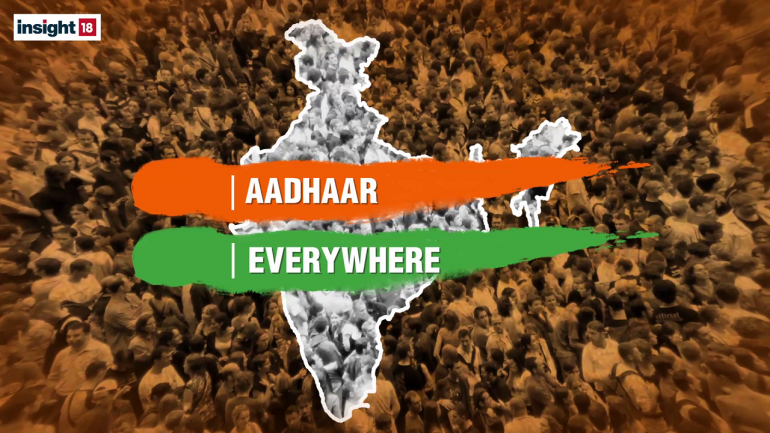Aadhaar an 'electronic leash' on citizens: Senior advocate Shyam Divan in Supreme Court
The argument was made before a five-judge Constititution bench headed by Chief Justice Dipak Misra which commenced hearing on a batch of petitions challenging the constitutional validity of the government's flagship Aadhaar programme and its enabling Act of 2016.
PTI@moneycontrolcom

Terming Aadhaar as "an electronic leash", a senior lawyer today told the Supreme Court that the government could completely destroy an individual by "switching off" the 12-digit unique identifier number.
The argument was made before a five-judge Constititution bench headed by Chief Justice Dipak Misra which commenced hearing on a batch of petitions challenging the constitutional validity of the government's flagship Aadhaar programme and its enabling Act of 2016.
However, the bench, also comprising Justices A K Sikri, A M Khanwilkar, D Y Chandrachud and Ashok Bhushan, countered senior advocate Shyam Divan, asking whether the state "cannot say that it has every right to find out the number of schools, children or the real beneficiaries of a welfare scheme and verify the real beneficiaries of huge funds which it is spending, it needs Aadhaar number. This is a valid argument."
It posed whether the government does not have the right to say that it was spending crores of rupees on welfare schemes and needed to verify whether benefits reached the needy and the leakages or pilferages of resources stopped.
The bench also asked what will happen to the biometric data collected before the Aadhaar Act, 2016 -- whether they will be destroyed if the petitioners challenging the validity of the Aadhaar programme succeeded.
Divan, who opened arguments on behalf of petitioners, said that through a succession of "marketing stratagems" and by employing "smoke and mirrors", the government has rolled out a "little understood" programme that seeks to "tether every resident of India to an electronic leash".
"This leash is connected to a central database that is designed to track transactions across the life of the citizen. This record will enable the State to profile citizens, track their movements, assess their habits and silently influence their behaviour. Over time, the profiling enables the State to stifle dissent and influence political decision making," he argued.
Divan said "the State is empowered with a 'switch' by which it can cause the civil death of an individual. Where every basic facility is linked to Aadhaar and one cannot live in society without an Aadhaar number, the switching off of Aadhaar completely destroys the individual."
He said the petitioners are certain that if the Aadhaar Act and the programme were allowed to operate "unimpeded", it would "hollow out" the Constitution, particularly the great rights and liberties it has assured to its citizens.
Divan is representing several petitioners like former Karnataka High Court judge Justice K S Puttaswamy, several activists Aruna Roy, Shantha Sinha and veteran CPI(M) leader V S Achuthanandan.
Divan, who argued through the day and would continue his submissions tomorrow, said "a person cannot avail the facility of a welfare scheme, if the finger prints do not match the templates set by UIDAI," he said, adding that for seven years, biometric data of individuals were collected without any legal framework but only on executive orders.
Moreover, over three crore citizens have not been able to register their biometric data, he said and asked how can the government exclude such a big part of the population who could not be registered without any fault on their part, from availing benefits.
Divan contended that at its core, Aadhaar alters the relationship between the citizen and the State and diminishes the status of the citizen.
Observing that the case at hand was unique as the programme was itself without any precedent, the senior lawyer said "no democratic society has adopted a programme that is similar in its command and sweep. There are few judicial precedents to guide us.
"The closest foreign cases have all been decided in favour of the citizens, repelling the invasive programmes by the State."
He said this case was about a new technology that the government has sought to deploy and a new architecture of governance has been built on this technology.
A people's Constitution will transform into a State Constitution, Divan said and asked whether the Constitution allowed the State to embrace this new programme or whether the key document repudiates "the giant electronic mesh that Aadhaar was creating."
He also expressed concern over extending the Aadhaar platform to private corporations, the degree of tracking and extent of profiling will "exponentially increase".
"Rights freely exercised, liberties freely enjoyed, entitlements granted by the Constitution and laws are all made conditional. Conditional on a compulsory barter. The barter compels the citizen to give up her biometrics 'voluntarily', allow her biometrics and demographic information to be stored by the State and private operators and then used for a process termed as 'authentication'," he said.
Divan said the Constitution balances rights of an individual against the State interest and "Aadhaar completely upsets this balance and skews the relationship between the citizen and the State...".
"The Constitution is not a charter of servitude. Aadhaar, if allowed to roll out unimpeded reduces citizens to servitude," Divan said.
At the fag end of the hearing, he said if Aadhaar Act is upheld, then in the alternative, no citizen should be deprived of any right or benefit for lack of an Aadhaar card.
The apex court had on December 15 last year extended till March 31 the deadline for mandatory linking of Aadhaar with various services and welfare schemes of all ministries and departments of the Centre, states and union territories.A nine-judge constitution bench of the apex court had last year, held that Right to Privacy was a Fundamental Right under the Constitution. Several petitioners challenging the validity of Aadhaar had claimed it violated privacy rights.
